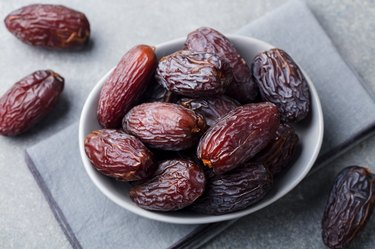
Much can go wrong when your body fails in major functions like sending messages from your brain via your nervous system or like contracting and relaxing muscles. This is one of many reasons you shouldn't skimp on nutrients — make sure you're getting foods that are good for nerves and muscles.
There's no single vitamin or mineral that takes care of nerves and muscles by itself. If you want everything to work properly, you need to make sure you're consuming a wide variety of foods, especially fruits and vegetables, which are full of the micronutrients you need.
Video of the Day
Video of the Day
In some cases, however, you'll find that animal products encompass many foods that are good for nerves and muscles, so if you're looking exclusively for plant-based food (for example, if you're vegan), you need to do a little extra planning.
The Importance of Vitamin B12
Peripheral neuropathy, a general term for disorders caused by damage to the system of nerves that run from the brain and spinal cord to the rest of the body, can be caused by malnutrition, specifically a lack of vitamin B12, according to the Foundation for Peripheral Neuropathy.
Unfortunately, fruits and vegetables are lacking in vitamin B12, which is found primarily in animal-based foods such as red meat, dairy products, fish, poultry and eggs.
If you're vegetarian or vegan, you need to get your vitamin B12 from either fortified grains or a supplement. This is especially important because, as the Foundation for Peripheral Neuropathy explains, a B12 deficiency can damage the myelin sheath that protects your nerves.
Without the myelin sheath, your nerves won't function properly. A vitamin B12 deficiency might start out mild but its symptoms could still include problems with the nervous system and brain function. If unaddressed, however, this damage could progress to the point of being debilitating.
Other Best Food for Nerves
The best foods for nerves include those that are high in other B vitamins, and like B12, they are mostly found in animal products. For example, vitamin B1, also known as thiamine, which plays a role in muscle contraction and nerve signal conduction, can be found in beef steak and pork, fish and eggs, but Medline Plus lists legumes, peas, nuts and seeds as good plant sources.
Another important nutrient is niacin, also known as vitamin B3. Plant-based sources of B3 include peanuts and enriched breads and cereal.
If you're looking to drink your nutrients, there might be a best juice for nerves: beetroot juice.
A July 2017 study published in the American Journal of Physiology, which looked at a small group of 14 participants, found that supplementation using beetroot juice could reduce muscle sympathetic nerve activity. This best juice for nerves is made from beets, which are a source of calcium, magnesium and potassium.
These same minerals aren't just found in the best juice for nerves — you can also turn to leaf vegetables for nervous system function. Leafy greens have magnesium, which is needed for nerve transmission, explains the University of Michigan.
Mustard greens are rich in calcium, which also plays a role in nerve function. And vegetables such as spinach have potassium for nerve transmission. These leaf vegetables for your nervous system will ensure those signals get sent from your brain efficiently.
Best Food for Muscles
Leaf vegetables are not for nerve repair alone — they're also great for muscles, as the University of Michigan points out. Those same greens that are full of magnesium are good for muscle contraction as well, and the mustard greens, which are a good source of calcium, can help muscles relax and contract. Vegetables with potassium are also good for muscle contraction.
And it's not just greens. Other vegetables are rich in these nutrients. Potassium can be found in fruits and vegetables like bananas, sweet potato, raisins, dates, peas and pumpkin. Calcium can be found in broccoli and legumes. Good sources of magnesium are artichokes and legumes.
Even though animal sources are an easy go-to for B vitamins and other foods that are good for nerves and muscles, these nutrients can be found in plenty of plant sources too. It just takes a little bit of extra planning to incorporate the right fruits, vegetables, beans and nuts into your diet.
- Foundation for Peripheral Neuropathy: “Nutritional and Vitamin Deficiency Neuropathy”
- American Journal of Physiology: “Acute Beetroot Juice Supplementation on Sympathetic Nerve Activity”
- Harvard Medical School: “Vitamin B12 Deficiency Can Be Sneaky, Harmful”
- MedlinePlus: “Thiamin”
- Johns Hopkins Medicine: “Overview of Nervous System Disorders”
- Michigan Medicine: “Minerals: Their Functions and Sources”
- My Food Data: “Beets”